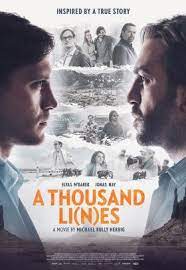
A THOUSAND LINES/ Tausend Zeilen
Germany, 2022, 93 minutes, Colour.
Elyas M'Barak Jonas Nay, Jorg Hartmann, Maria Burchard, Michael Ostrowski, Michael Meertens, Sara Fazilat, Jeff Burrell.
Directed by Michael Herbig.
The German title is very straightforward – the poster for the English title is able to make a sardonic comment that the German title cannot: A Thousand Li(n)es.
With television footage of Donald Trump appearing early in the film, we immediately think of “Fake News”. And, this is a film about the fabrication of news, based on actual characters and events, the prestigious German magazine, Der Spiegel, and a multi-award-winning young journalist. (With an acknowledgement to Wikipedia providing a great deal of information about characters and events, it is worth Googling Claas Relotius to read the background of this fictionalised version and how it keeps quite close to what actually happened.)
Basically this is a drama, a focus on a Spanish-born German journalist for Der Spiegel, Juan Romero, who wrote the book on which this film is based. But, there is some joking in the introduction about this being a fiction, based on fact, but allegedly mostly made up – honestly! This sets a tone that this treatment is sometimes satiric, sometimes a parody, quite funny moments. The film has been criticised by some for its parody tone, the critics wanting a more straightforward, deeper exploration of the journalist creating stories, being hailed for his writing, winning many awards, investigated and exposed.
The journalist of this film, called Lars Bogenius (Jonas Nay) is presented as something of a nice, naive journalist, very active in the field, Syria, US, Mexico… And finding dramatically significant stories which go on to win (as they did in real life) many press awards. Only gradually is the true Lars revealed. But the dramatic focus of attention is on Juan Romero (Elyas M’Barak), a sincere journalist, loving wife, four charming little daughters, who is invited by Bogenius to collaborate in articles, then found wanting, but also determining that there are inconsistencies in Bogenius’s stories, his travelling to Mexico and the US with his photographer to try to find out the truth. And he does, providing evidence.
However, in its satirical way, the film is highly critical of the editors of the magazine, Chronic standing in for Der Speigel, their ambitions, place in the company’s hierarchy, of playing golf, urging journalists to write dramatic articles, articles to get readers emotionally involved. And the satire continues in their fending off the criticism, unwillingness to face the truth, their unmasking even as they condemn Romero.
While there have been many serious films about investigations of journalistic fraud, the satiric tone of this film engages the audience imagination and sense of humour as it exposes the fraud.
- A true story? Based on an actual journalist? His stories? His self-promotion? Awards? And writing for der Spiegel?
- The tone of the film, reporting on actual events, the truth, but the opening and the comment on much of this being fictionalised, honestly? The satiric tone and the parody rather than a serious investigation? Although the investigation was serious?
- The story of Lars Bogenius, enigmatic background, the story of his sister and that being a fiction, his wide travels around the world, the range of stories, especially the civil war in Syria, interviews with athletes? The many articles? His status with the management of the magazine, their promoting him, urging human interest stories more than factual stories, the awards?
- The introduction to Juan, Spanish background, working for Der Spiegel, his reputation, support of his wife, the four little girls, family life? His work for the magazine, reputation, contact from Bogenius, their working together, the research in Mexico, work with his photographer? Bogenius and his complaints, putting down Juan? The authorities?
- The portrait of the management, their ambitions, their perspective on the magazine, the kinds of stories they wanted, promoting bugging years, going to the award ceremony? Juan and his information, then meeting him, condemning him, the rejection? And this coming back to bite them?
- Juan, finding the inconsistencies in the articles, his research, contacting Bogenius? The decision to go to Mexico and America, with his photographer, interviewing the various people, especially the background story in America, interviewing the man in his trailer, the discovery of the truth, others interviewed and their reactions?
- The authorities, not accepting the research, Juan and his being away and the effect on his family, his little girls thinking he did not love them, but the support of his wife?
- The exposure of Berg genius, his background story, the reality of his short visits to locations, his making up the story, the appeal for the children in Syria, exposure?
- The effect of the satirical approach, the comic touches, the serious investigation, and the fact that this was based on actual characters and events?